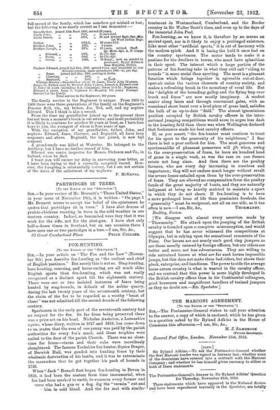FOX-HUNTING.
[To THE EDITOR OF THE " SPECTATOR."]
Sin,—In your article on " The Fox and the Law" (Novem- ber 9th) you describe fox-hunting as "the earliest and chief of English pastimes." But surely this is not so. Stag-hunting, hare-hunting, coursing, and horse-racing are all much older English sports than fox-hunting, which was not really recognized as a distinct sport till the eighteenth century. There were one or two isolated instances of foxes being hunted by stag-hounds, in default of the nobler quarry, during the last twenty years of the seventeenth century, but the claim of the fox to be regarded as a worthy "beast of chase" was not admitted till the second decade of the following century.
Sportsmen in the early part of the seventeenth century had no respect for the -fox. -So -far -from -being preserved there was a price set on his head. Nicholas Assheton, a Lancashire squire, whose diary, written in 1617 and 1618, has come down to us. states that the sum of one penny was paid-by the parish ,authorities for every fox's mask, and these trophies were nailed to the door of the parish Church. There was no close- -time for foxes—vixens and their cubs were .mercilessly slaughtered. The famous Yorkshire fox-hunter, Squire Draper, of Berwick Hall, was goaded into hunting foxes by their wholesale destruction of his lambs, and it was to exterminate the marauders that he got together his pack of hounds in 1726.
When" Jaek " Russell first began fox-hunting in Devon in 1826, it had been the custom from time immemorial, when fox had been marked to earth, to summon every farmer and -curer who had a gun or a dog, dig the " vermin " out and; him in cold blood. And the fox met with aimilori
treatment Westmorland, Cumberland, and the Border country in Sir Walter Scott's time, and even np to the days Of the immortal John Peel.
Fox-hunting, as we know it, is therefore by 310 means an ancient sport, nor is it likely to enjoy a prolonged existence. Like most other "artificial sports," it is out of harmony with the modern spirit. And it is losing the bold it -once had on the country sportsman. The motor tends to make it pastime for the dwellers in towns, who must have sybaritism in their sport. The interest which a large portion of the patrons of fox-hunting take in what they still call "riding to hounds " is more social than sporting. The meet is a pleasant function which brings together in agreeable out-of-door, open-air union the various elements of country society, and makes a refreshing break in the monotony of rural life. But the "delights of the bounding .gallop and the flying leap over brook and fence " are now mostly imaginary. A modest canter along lanes and through convenient gates, with an occasional short burst over a level piece of grass land, satisfies the bulk of an up-to-date " field." The almost ignominioua position occupied by British cavalry officers in the inter- national jumping competitions would seem to argue less dash in the hunting field than there was when Wellington• declared that foxhunters made his best cavalry offiners.
If, as you assert, "the fox-hunter must continue to trust for his sport to the generosity of his neighbours," I fear there is but a poor outlook for him. The most generous an$ sportsmanlike of pheasant preservers will jib when, owing to the over-preservation of foxes, he loses six hundred head of game in a single week, as was the case on one Sussex estate not long since. And then there are the poultry farmers, who are every day increasing in numbers and importance; they will not endure much longer without revolt the severe losses entailed upon them by the over-preservation of foxes. They are allowed no compensation from the poultry funds of the great majority of hunts, and they are naturally indignant at being so heavily mulcted to maintain a sport in which they do not share. If fox-hunting is to have a more prolonged lease of life than pessimists forebode, the " generosity " must be reciprocal, not all on one side, as it too [We disagree with almost every assertion made by " Thormanby." His attack upon the jumping of the British cavalry is founded upon a complete misconception, and would suggest that he has .nev_er witnessed the competitions at Olympia, but is relying upon the sensational comments of the Press. Our horses are not nearly such good ring jumpers as are those usually entered by foreign officers, but our riders are better and more, not less adventurous. They are willing to ride untrained horses at what are for such horses impossible jumps, but this does not make them bad riders, but shows their pluck, enterprise, and handiness. The power to ride the average horse a,ctoss country is what is wanted in the cavalry officer, and we contend that this power is more highly developed in the British cavalry officer than in his Continental colleagues, good horsemen and magnificent handlers of trained jumpers as they no doubt are.—En. Spectator.]














































 Previous page
Previous page